Welcome to another issue of The Newport Cornucopia where we dig through the newspapers archives for interesting news articles and adverts. All articles are posted verbatim and most headlines are original (headlines in quotes are my own).

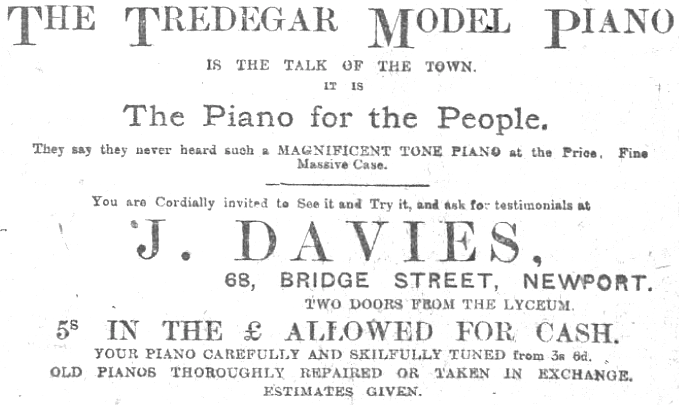
'An Apology'
TO HENRY PALMER, ESQ., CASTLETOWN
Near Newport, Monmouthshire
Sir, I Most readily express my regret at having arrested you for £400, when in fact it turns out there was no debt due by you to me and I hope you consider it a proof of the sincerity of my regret, that I sent to you an unconditional discharge, free of expense.
If this occurrence has injured you in the estimation of your friends or neighbours, and you think this letter will, in any degree, counteract that injury, you are at liberty to use it as you please, and I trust it will be sufficiently satisfactory to induce you to forego any further proceedings against me.
I am Sir, your most obedient Servant, S. YATES.
— Monmouthshire Merlin, Saturday 18th June, 1836

A Modern Ballad Monger
A sturdy fellow, of the "navvy" class, named George Kingdom, was charged with vagrancy, and an assault on George Chandler, beerhouse-keeper. Complainant showed that defendant came in his house, and begged; and then boasted of his vocal abilities. He was invited to sing; but made so hideous a noise, that he was offered a penny to go away; when he became abusive, and "wouldn't turn out for not no man."
The landlord attempted the task of putting him out, when the "singer" took a square out of his coat, as the Clerk described it, on the latter garment being held up. The defendant now said that he was not begging: he was simply trying to exchange ballads for halfpennies. (Laughter) He was out of work, and tried his hand at ballad-mongering; but he scorned the imputation of being a beggar.
Mr Evans said it was likely that any man desiring work, would be long without it now. The Mayor sent the ballad-man to prison for a month, as a vagabond.
— Monmouthshire Merlin, Saturday 4th November, 1853
Bringing "Grist to the Mill"
Hannah Oswell, who seemed a shrew, was charged with being disorderly in the street. P.C. Grist stated that he saw the prisoner fighting, and desired her to go home. She would not; but became disorderly. He quietly remonstrated with her; but his patience was unavailing — it embolded her to be more violent. He was then taking her to the station, as a disorderly character, when she "let fly" at his face with her fist, and "pitched into" his "understandings" with her feet, so nimbly and with so much effect, that she brought "Grist to the mill" in quick time; and he thereupon got the better of her pugilistic attempt, and caged her. Fined 10s., 9s. costs, or 21 days imprisonment.
— Monmouthshire Merlin, Saturday 4th November, 1853
Cock-Fighting
Daniel Bird, John Rodney, Edward Morgan, and James Davies, all of Newport, were charged, on the complaint of Mr Peter Todd, of the New Town, Bane's Well, with encouraging two cocks to fight. One of the defendants appeared, and stated to the Bench that the case was settled. Mr Champ, who appeared for all the defendants, said he did not know that the "case" had been settled; but he would content it was no case at all. Rees Rees, constable, said that the case was not settled, so far as he was concerned; for he had not been paid. Case dismissed, and the constable was desired to get 10s. costs from mr Todd, for having "set the law in motion."
— Monmouthshire Merlin, Saturday 4th November, 1853
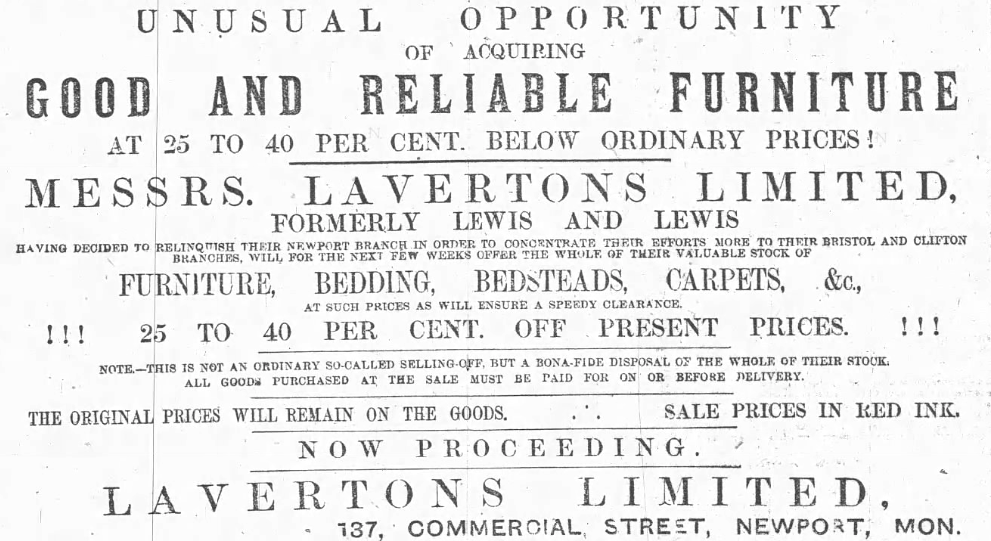

Youthful Highwaymen
Patrick Foley, John Mahoney, and William Dunn, three street boys, were charged with stealing 2s. and other coin, a purse, a skate, handkerchief, &c., from John Walter Wheeler, on the 30th January.
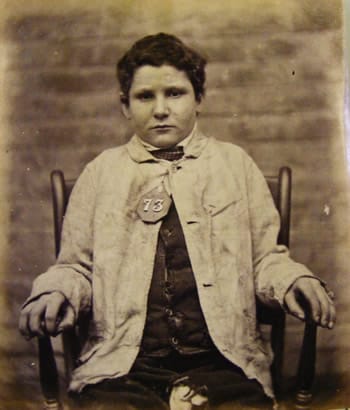
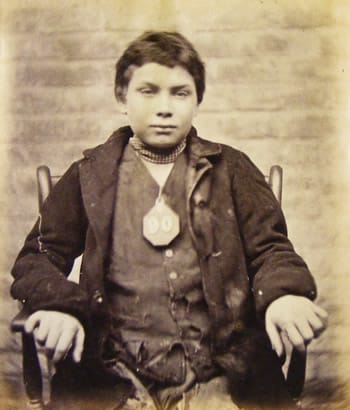
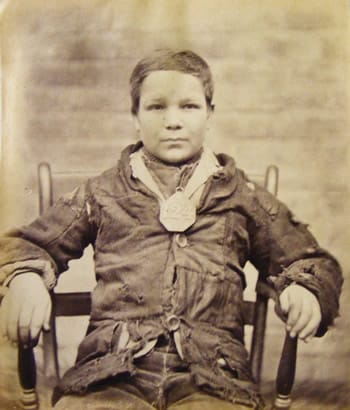
Patrick Foley, John Mahoney and William Dunn (Source: Newport Past & Gwent Archives)
On Monday last Wheeler went to a pond by Rodney Wharf, to skate, and whilst putting on his skates was surrounded by the prisoners and other boys. One of them wanted money for tobacco, and when he replied that he had none to give, they threatened to have his money or his life; Mahoney snatched away one of his skates, Foley and Dunn then emptied his pockets, and after threatening to put him under the ice, in a hole which some of them had commenced, they all ran away, leaving their victim nearly frightened to death.
The boys all pleaded guilty, and were sentenced to three months' hard labour.
— Monmouthshire Merlin, Saturday 7th February, 1871

'Tygwinbach Lane, Newport'
To the Proprietors of the Level Lands occupied through Tygwinbach Lane, in the Parish of St. Woollos, near Newport.
GENTLEMEN,—I beg leave to call your attention to the disgraceful state of the road leading to the level lands occupied through Tygwinbach-lane, which have now become impassable by man or beast six months in the year. It is certainly very much to be lamented that a tract of fine land comprising between 6 and 800 acres should be left without the possibility of improvement through the badness of the roads, particularly when such an opportunity presents itself of procuring materials free of any expence (sic) at Pillgwenlly, from whence they may be conveyed by a temporary tram road across the fields to Tygwinbach, a distance of about 400 yards. There are ballast-jetties in convenient situations, and the materials may be discharged at once into trams for conveying away to the road. A line from Tygwinbach to the extreme ends of the road, being a distance of about 1 1/4 mile, may be made from 15 to 18 feet wide, at about 6s per yard (and perhaps much less) and which, when completed, will afford great profit and accommodation to both landlord and tenant, by enabling them to dispose of their produce at convenient seasons at Newport and Pillgwenlly.
This communication would at once improve the property of the level full 20 per cent. and be in other respects of incalculable benefit. If a meeting of those interested were to take place, I have no doubt some immediate measures would be adopted for carrying my suggestions into effect, more especially as the winter is now fast approaching, and will throw out of employment a great number of poor labourers, to whom such an undertaking would supply the means of obtaining their livelihood until a more favourable season. Hoping that you will now open your eyes to the necessity of an improvement, recommended by policy, humanity, and self-interest,
I am, gentlemen, your most obedient servant, A FRIEND TO THE POOR.
— Monmouthshire Merlin, Saturday 17th December, 1831

Works on the South Wales Railway
An interesting piece from the Monmouthshire Merlin in 1846 describing the progress of the South Wales Railway through Newport.
The rapid progress made in the incipient operations of this important undertaking excites so much interest throughout this district, that, as promised in our last, we furnish a Statement of Works, in addition to an account of proceedings in reference to the line, which will be found in other parts of this paper.
Contract No. 1, Newport.— These works commence at Maindee, and terminate one mile below the Ebbw River. The bridge across the River Usk is to be of wood, and will be 65 feet above low water; it will be supported by a stone pier on each side of the river, 24 feet high. The line will run along to the level of the top of Thomas street, through the houses in Mill street and Pentonville, to the embankment over the Dragon Field and Six Acres; which embankment will be 15 feet high.
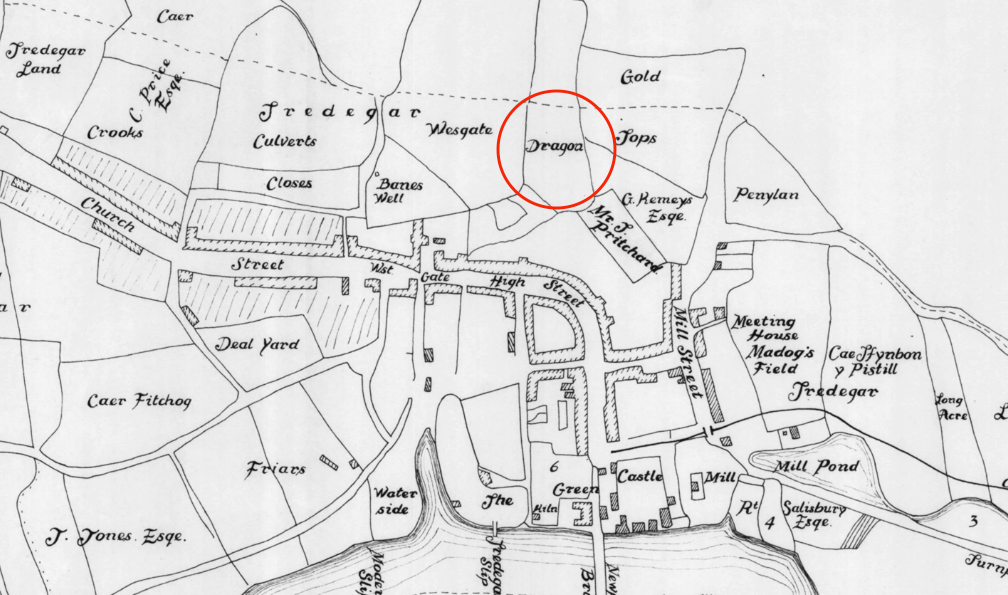
A bridge is nearly completed for the accommodation of the landowners, under the embankment, the top of which will be composed of timber. The open cutting runs up to the flag staff above the pit, in the Hill Field, where the tunnel is to commence, at a depth from the surface, of 77 feet. The first pit is sunk to the depth of 65 feet; the second to that of 80 feet; which two are to be infilled up at the completion of the work. The two shafts, one on each side of the Bathing House, at the back of Bryn Hyfrid, have the engines erected, and are in rapid progress. The lower shaft is sunk 66 1/2 feet; to sink, 21 feet. The upper one is sunk 63 feet; to sink, 85 feet. The shaft in the Fir-tree Field is sunk 68 to sink, 90. The one beyond the Fir Field is sunk 65 feet; to sink, 65. These four last are to be permanent, and rails on the top.
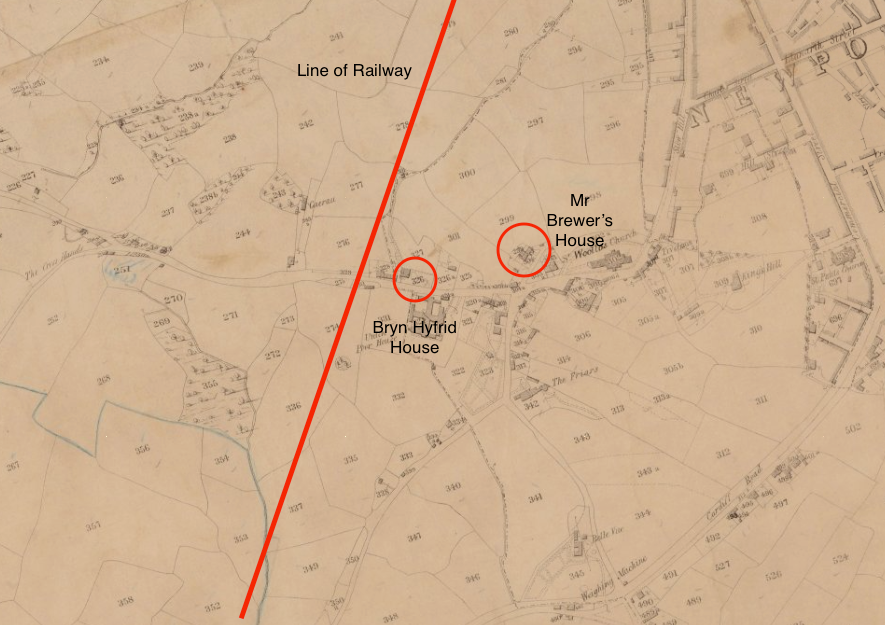
The tunnel terminates at the flag pole in Mr. Brewer's field, where the open cutting again commences, at a depth from the surface, of 66 1/2 feet, running along through the fields to near Waterloo Gate, where it passes under the turnpike and tram roads, at a depth of 17 feet; when the cutting terminates, and another embankment occurs, 15 feet high, crossing the Moors to Maes Glaes Wood, where an open cutting of 17 feet leads to Ebbw River, which it crosses at a height of 16 1/2 feet above the level of high water and is to be supported by piles, from which an embankment runs to the end of the contract.
The total number of men engaged on this contract at present, is 400, with 40 to 50 horses. The pits and shafts are worked night and day, the tunnel running through a bed of rock the whole way. The habitations above the Union House already feel the effects of their operations, as the pits have drawn off all the water, in consequence of their great depth below all the wells. The baths attached to Bryn Hyfrid are rendered useless; and the famed spring well on the hill is, we regret to say, dry. It is to be hoped that the valuable spring of Bane's Well will not be affected by it, though it is much feared by the inhabitants of the neighbourhood. How unfortunate it is that the Newport and Pillgwenlly Water Works Company have been incorporated. They should begin operations without delay.
The estimated time for the completion of the work here, is two years and for the line from here to Cardiff, three years. Messrs. Rennie and Co., the spirited contractors, are determined that no expense shall be spared to prosecute and complete the work in the above time.
Sunday working is, we now understand, strictly prohibited, except in cases of great necessity, or to avoid danger.
The railway will cross the Caerleon road just beyond the turnpike by a bridge, 20 feet above the road and the embankment runs along Maindee, as far as Bowler's house, and opposite to Mr. Wilmett's new house the cutting again commences. The provision trade of the town experiences a considerable impetus, by the good appetites of the 400 sturdy "navies".
— Monmouthshire Merlin, Saturday 19th September, 1846

Dr Vint's Hypnotic Entertainment
Hypnotism and its wonders were revealed at the Temperance Hall, Newport, on Monday night, by Dr Vint, who then gave the first of four performances. This is not Dr Vint's first visit to Newport, and his practice of the wizardry of mesmerism was not less striking than on previous occasions.
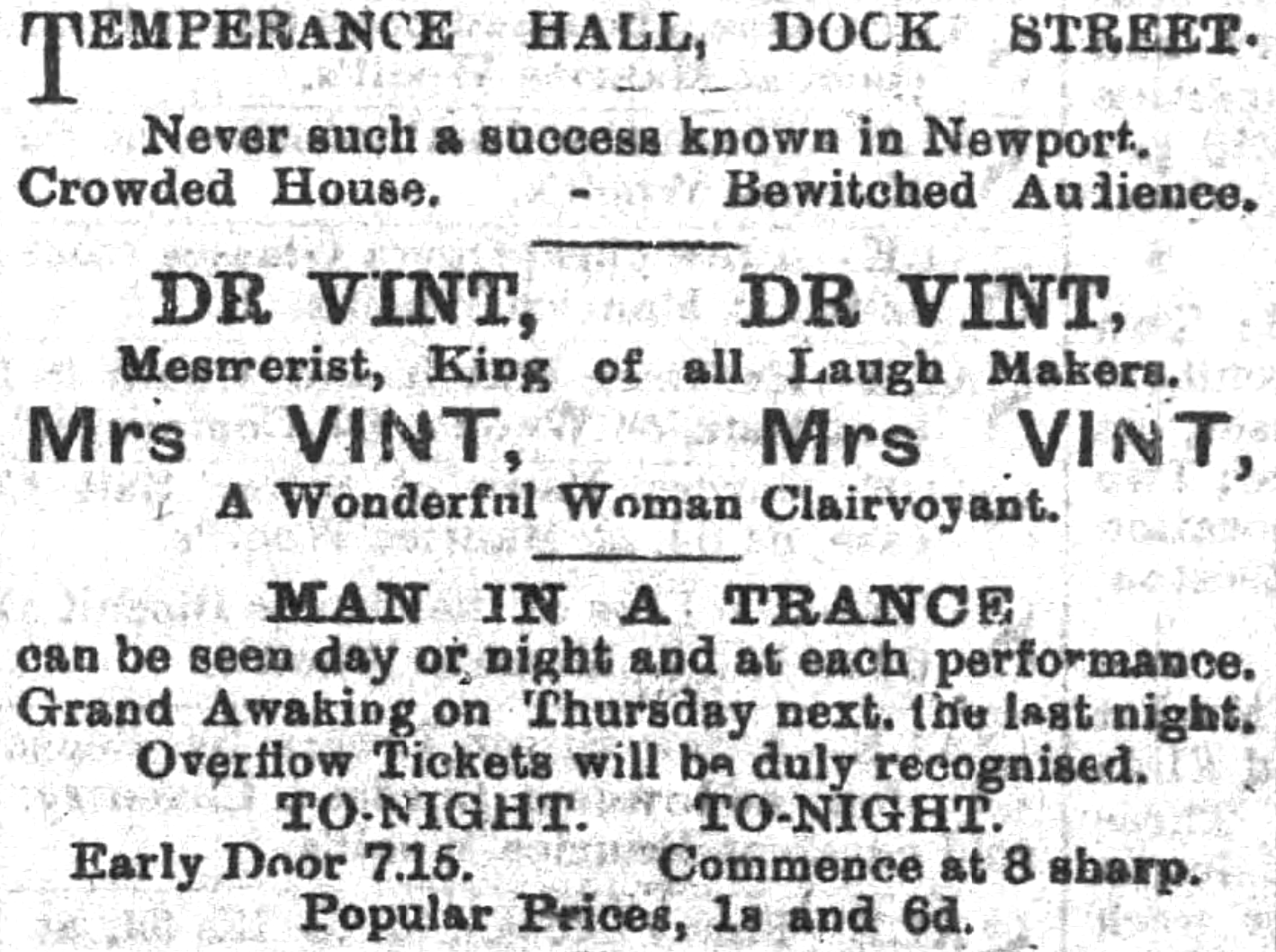
From the audience he gathered several male subjects, and by the exercise of his hypnotic power he placed them completely under control, and made them play the fantastic tricks.
There were certain features of his entertainment which were distinctly gruesome, such as the passing of a needle through the cheek, tongue and lips of three of the subjects.
It is hard to believe that a man can eat tallow and swallow a mixture of paraffin, castor oil, cayenne pepper, and mustard, without suffering ill effects; but these things were done and the men seemed to be none the worse. These parts of the performance seem to be quite unnecessary, and they certainly are not amusing.
The humourous portion of the entertainment was extremely good. The antics of the men who were assured that they were members of Parliament were too funny for description; and there were scores of other laughter-compelling incidents. Madame Vint also have a remarkable proof of her powers as a clairvoyant, and may people who had written questions about missing relatives and articles were given answers. Dr Vint's entertainment was a most striking one throughout.
— South Wales Weekly Argus, Saturday 2nd May, 1896 (Subscription Required)

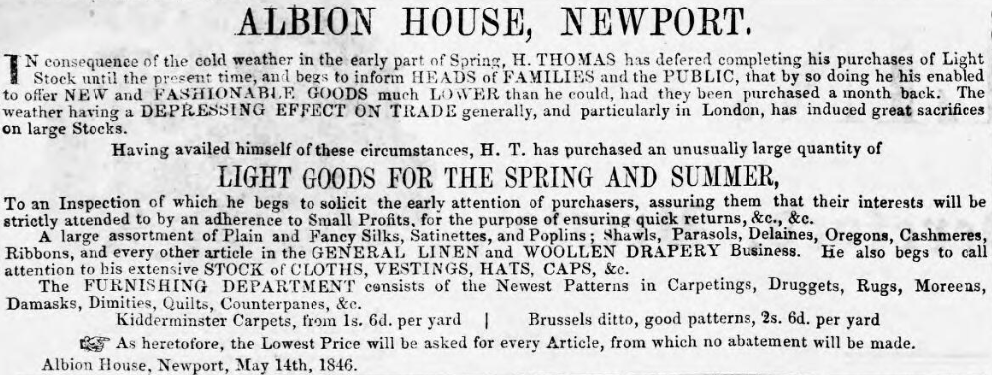

'Ta-ra-ra Boom-de-ay'
At The Empire on 7th November, 1899, singer Lottie Collins performed. Billed as the 'celebrated light comedienne' she was most famous for introducing the song "Ta-ra-ra Boom-de-ay" to England.
She started performing in music halls around 11 or 12 in 1877 with her sisters and continued to have a successful career touring the UK and America where she first heard Ta-ra-ra Boom-de-ay in 1891.
While touring in vaudeville in the United States she heard the song "Ta-ra-ra Boom-de-ay!" After she sang it at the Tivoli Music Hall in London in November 1891, it became her signature piece. She would sing the first verse demurely and then launch into the chorus and an uninhibited and exhausting skirt dance with high kicks (especially on the word "BOOM") that exposed her stockings held up by sparkling garters, and bare thighs. She sang the song at performances of the Gaiety Theatre's burlesque Cinder Ellen up too Late beginning on 14 March 1892 and according to her obituary, at the height of the craze was performing it five times nightly at different venues in London. — Wikipedia
When she returned to America in 1892 to perform Ta-ra-ra Boom-de-ay, she received a bad review from the New York Times who described her as a 'mature woman'.
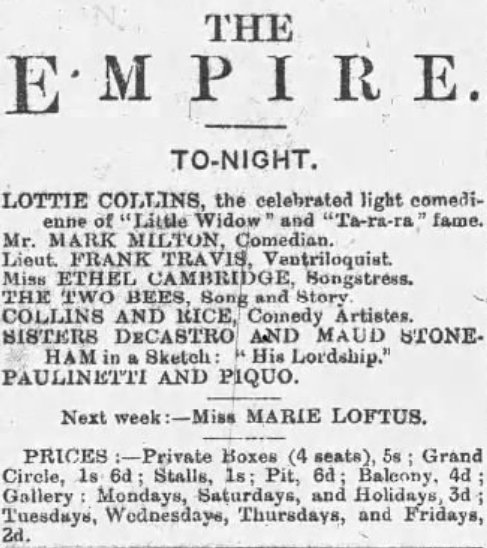
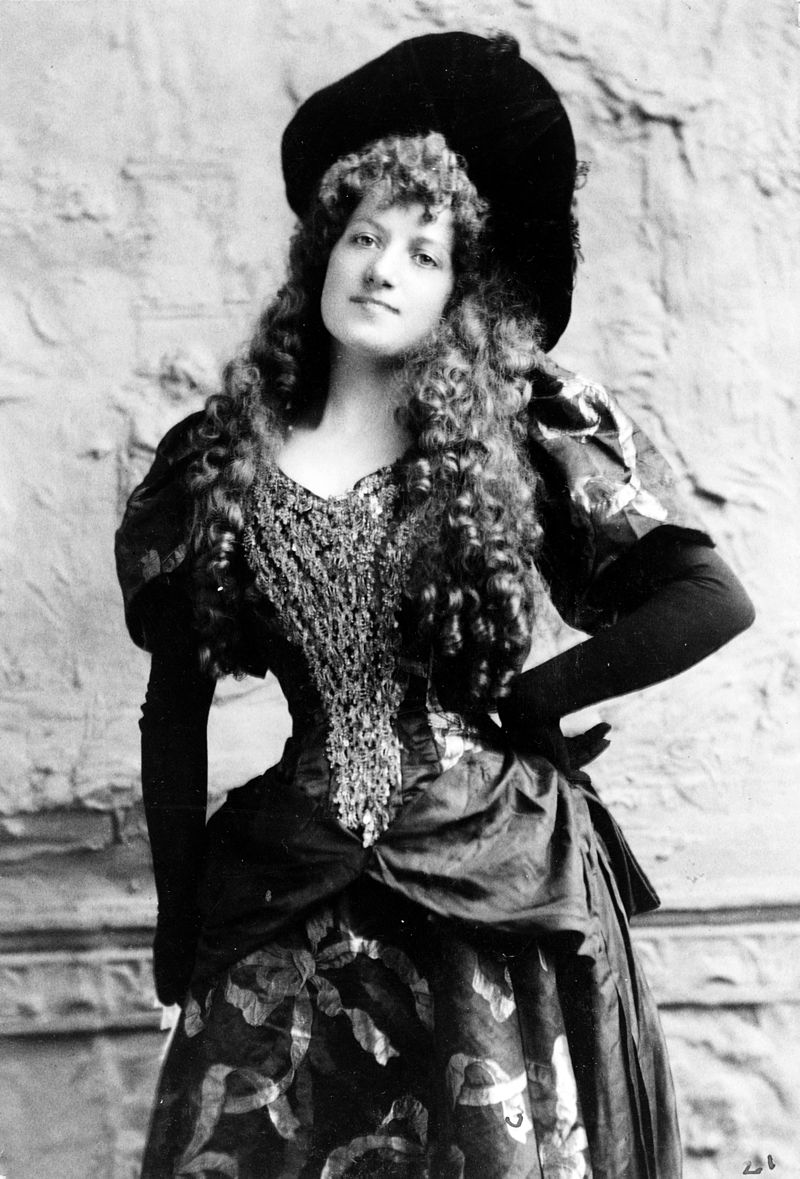
— South Wales Argus, 7th November, 1899 (Subscription Required)
Also playing that night was Lt. Frank Travis, a ventriloquist. Born in Yorkshire he was most famous for appearing as a Chelsea Pensioner. Arthur Lloyd has a very long piece about the Travis who supposedly was the originator of being able to smoke and drink while talking in a ventriloquist scene.


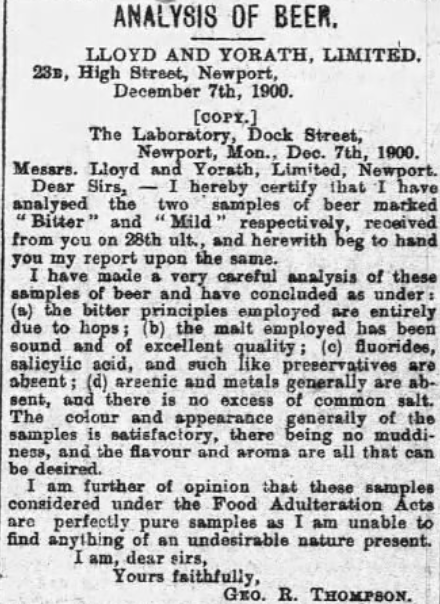


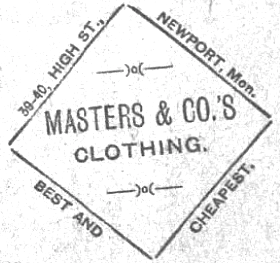

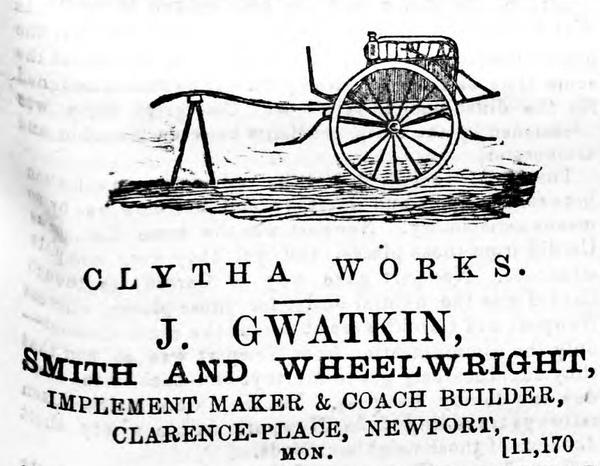
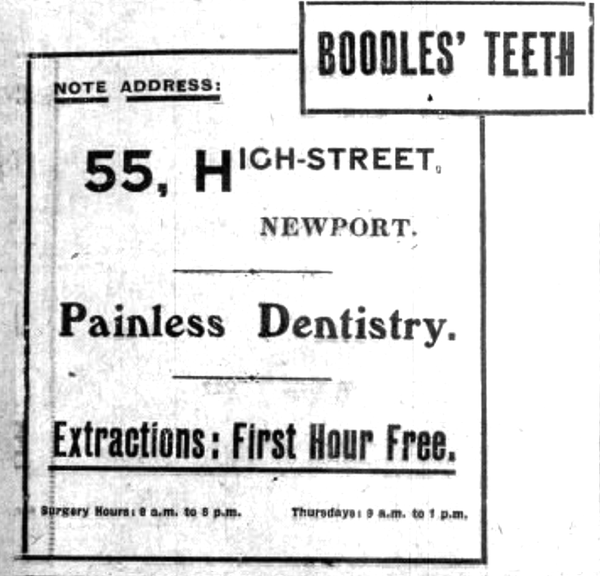
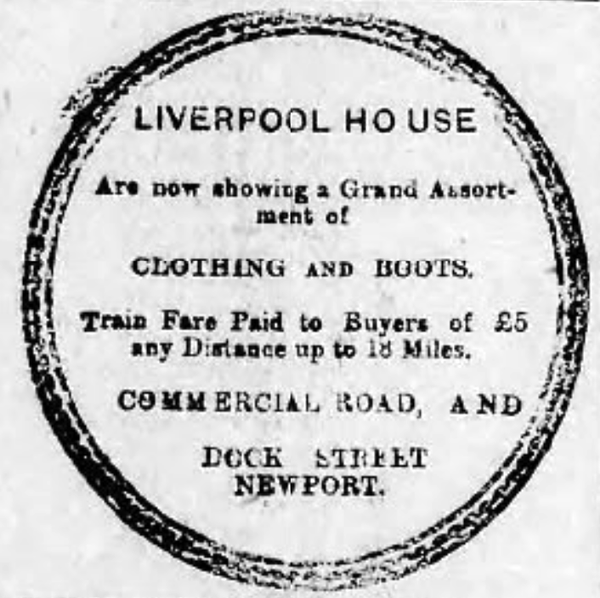
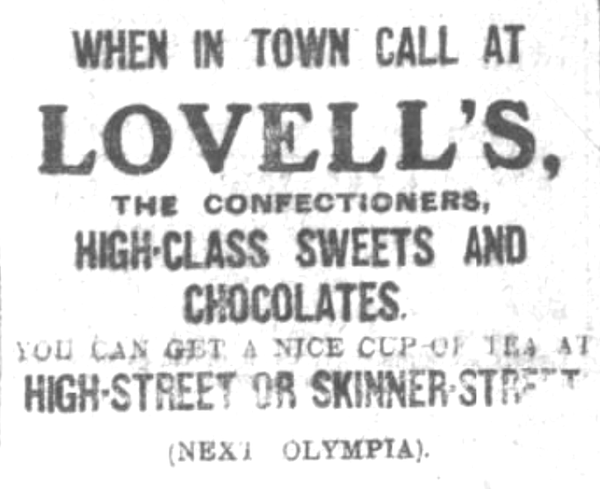
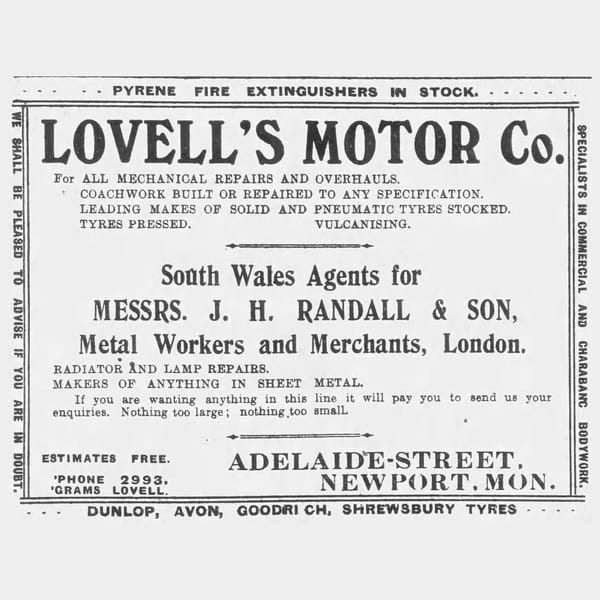
Member discussion